Analyzing Postnatal Depression: A Sociological Case Study Approach
VerifiedAdded on 2023/03/30
|8
|1861
|101
Case Study
AI Summary
This case study analyzes a married couple, Julie and Ben, where Julie suffers from postnatal depression, impacting her behavior, thoughts, and family dynamics. It explores the psychosocial issues Julie faces, such as mood swings, financial difficulties, and withdrawal from family responsibilities. The analysis considers informal supports Ben can provide, including patience, active listening, and seeking professional help. Professionals and agencies like psychological therapists, general practitioners, and support organizations are identified as potential resources. The study also highlights gaps in service delivery, such as stigma, financial barriers, and disjointed healthcare systems, and suggests advocacy efforts to improve detection rates and support for affected mothers. The case study emphasizes the far-reaching implications of postnatal depression on the entire family and the importance of addressing it through various support systems.
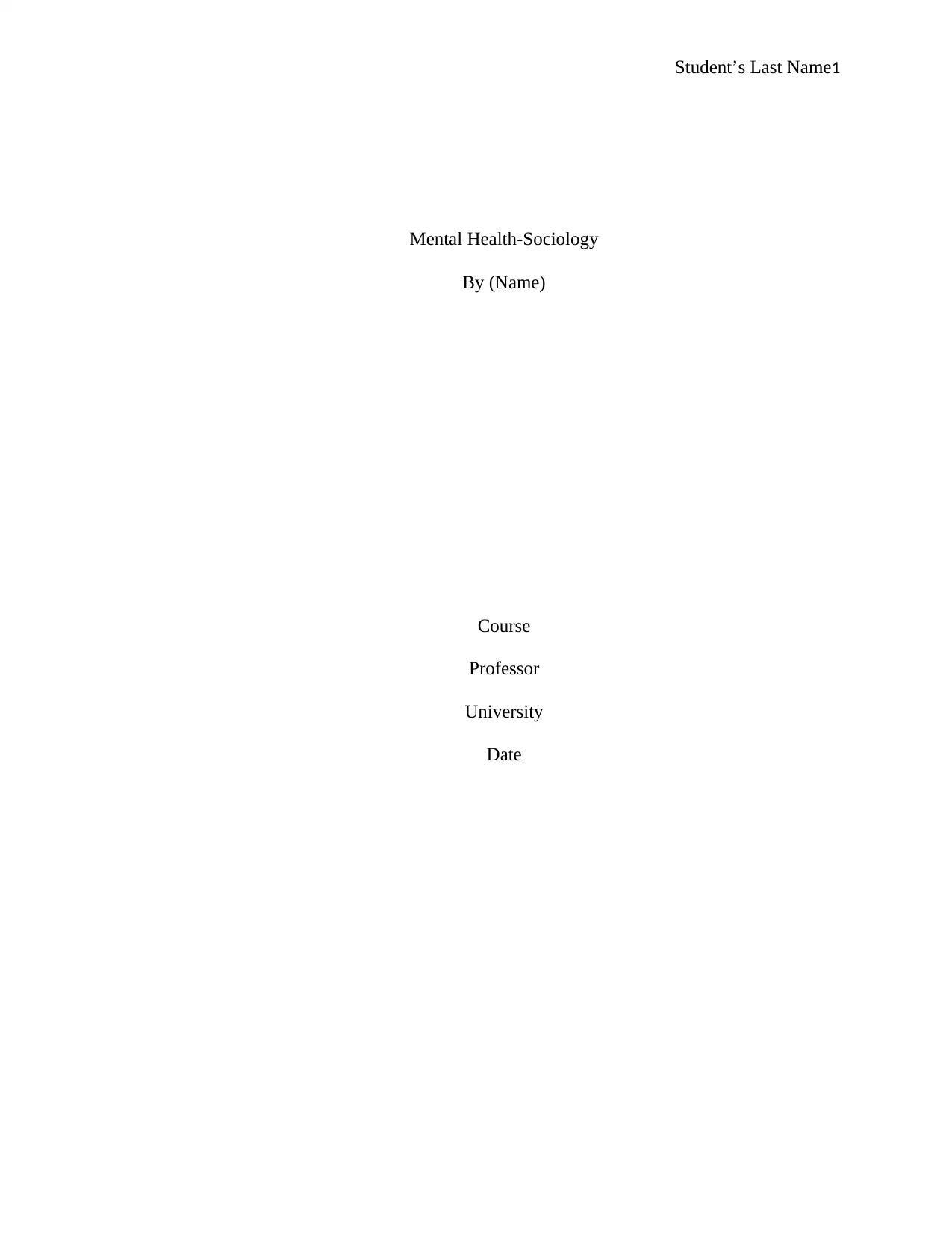
Student’s Last Name1
Mental Health-Sociology
By (Name)
Course
Professor
University
Date
Mental Health-Sociology
By (Name)
Course
Professor
University
Date
Paraphrase This Document
Need a fresh take? Get an instant paraphrase of this document with our AI Paraphraser
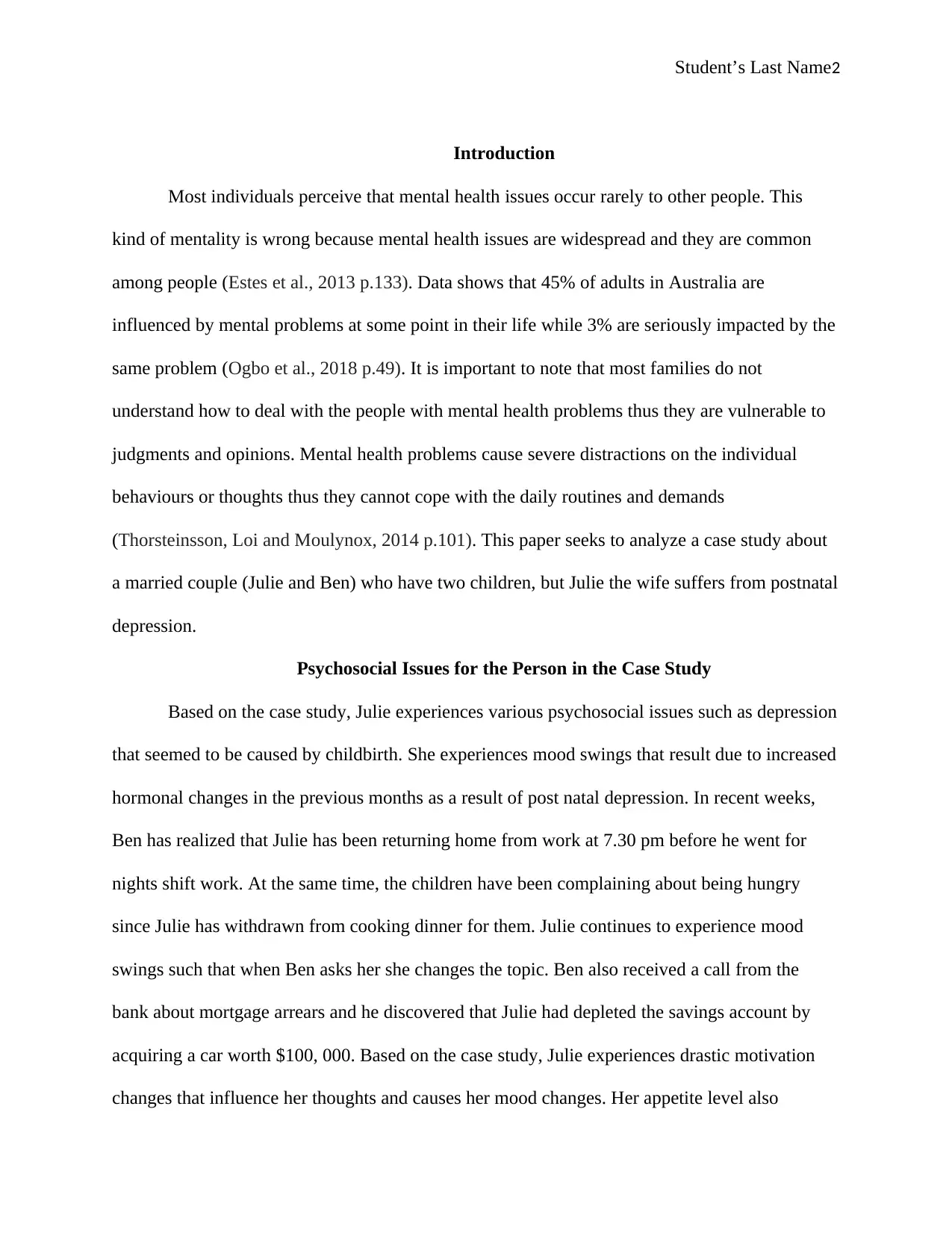
Student’s Last Name2
Introduction
Most individuals perceive that mental health issues occur rarely to other people. This
kind of mentality is wrong because mental health issues are widespread and they are common
among people (Estes et al., 2013 p.133). Data shows that 45% of adults in Australia are
influenced by mental problems at some point in their life while 3% are seriously impacted by the
same problem (Ogbo et al., 2018 p.49). It is important to note that most families do not
understand how to deal with the people with mental health problems thus they are vulnerable to
judgments and opinions. Mental health problems cause severe distractions on the individual
behaviours or thoughts thus they cannot cope with the daily routines and demands
(Thorsteinsson, Loi and Moulynox, 2014 p.101). This paper seeks to analyze a case study about
a married couple (Julie and Ben) who have two children, but Julie the wife suffers from postnatal
depression.
Psychosocial Issues for the Person in the Case Study
Based on the case study, Julie experiences various psychosocial issues such as depression
that seemed to be caused by childbirth. She experiences mood swings that result due to increased
hormonal changes in the previous months as a result of post natal depression. In recent weeks,
Ben has realized that Julie has been returning home from work at 7.30 pm before he went for
nights shift work. At the same time, the children have been complaining about being hungry
since Julie has withdrawn from cooking dinner for them. Julie continues to experience mood
swings such that when Ben asks her she changes the topic. Ben also received a call from the
bank about mortgage arrears and he discovered that Julie had depleted the savings account by
acquiring a car worth $100, 000. Based on the case study, Julie experiences drastic motivation
changes that influence her thoughts and causes her mood changes. Her appetite level also
Introduction
Most individuals perceive that mental health issues occur rarely to other people. This
kind of mentality is wrong because mental health issues are widespread and they are common
among people (Estes et al., 2013 p.133). Data shows that 45% of adults in Australia are
influenced by mental problems at some point in their life while 3% are seriously impacted by the
same problem (Ogbo et al., 2018 p.49). It is important to note that most families do not
understand how to deal with the people with mental health problems thus they are vulnerable to
judgments and opinions. Mental health problems cause severe distractions on the individual
behaviours or thoughts thus they cannot cope with the daily routines and demands
(Thorsteinsson, Loi and Moulynox, 2014 p.101). This paper seeks to analyze a case study about
a married couple (Julie and Ben) who have two children, but Julie the wife suffers from postnatal
depression.
Psychosocial Issues for the Person in the Case Study
Based on the case study, Julie experiences various psychosocial issues such as depression
that seemed to be caused by childbirth. She experiences mood swings that result due to increased
hormonal changes in the previous months as a result of post natal depression. In recent weeks,
Ben has realized that Julie has been returning home from work at 7.30 pm before he went for
nights shift work. At the same time, the children have been complaining about being hungry
since Julie has withdrawn from cooking dinner for them. Julie continues to experience mood
swings such that when Ben asks her she changes the topic. Ben also received a call from the
bank about mortgage arrears and he discovered that Julie had depleted the savings account by
acquiring a car worth $100, 000. Based on the case study, Julie experiences drastic motivation
changes that influence her thoughts and causes her mood changes. Her appetite level also
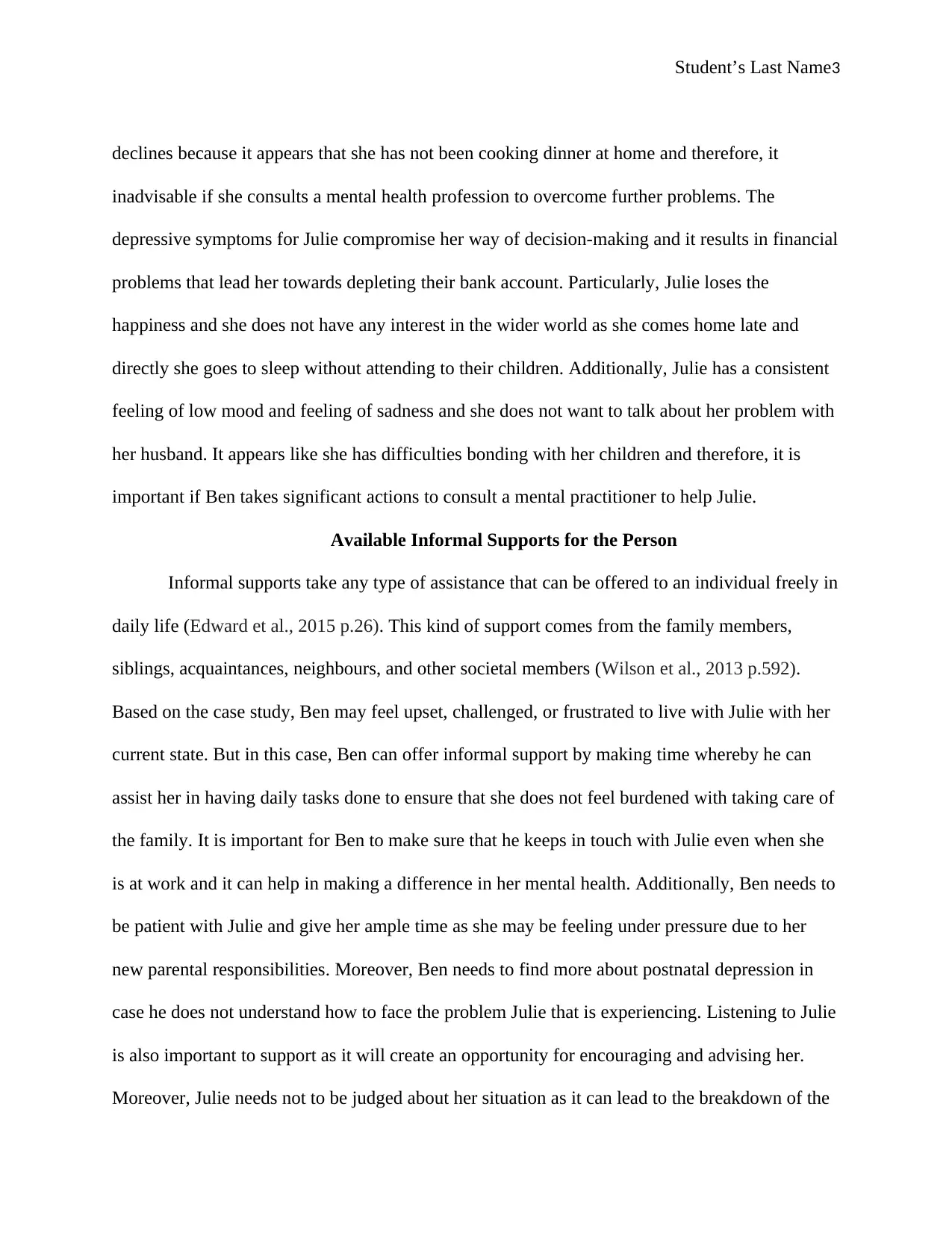
Student’s Last Name3
declines because it appears that she has not been cooking dinner at home and therefore, it
inadvisable if she consults a mental health profession to overcome further problems. The
depressive symptoms for Julie compromise her way of decision-making and it results in financial
problems that lead her towards depleting their bank account. Particularly, Julie loses the
happiness and she does not have any interest in the wider world as she comes home late and
directly she goes to sleep without attending to their children. Additionally, Julie has a consistent
feeling of low mood and feeling of sadness and she does not want to talk about her problem with
her husband. It appears like she has difficulties bonding with her children and therefore, it is
important if Ben takes significant actions to consult a mental practitioner to help Julie.
Available Informal Supports for the Person
Informal supports take any type of assistance that can be offered to an individual freely in
daily life (Edward et al., 2015 p.26). This kind of support comes from the family members,
siblings, acquaintances, neighbours, and other societal members (Wilson et al., 2013 p.592).
Based on the case study, Ben may feel upset, challenged, or frustrated to live with Julie with her
current state. But in this case, Ben can offer informal support by making time whereby he can
assist her in having daily tasks done to ensure that she does not feel burdened with taking care of
the family. It is important for Ben to make sure that he keeps in touch with Julie even when she
is at work and it can help in making a difference in her mental health. Additionally, Ben needs to
be patient with Julie and give her ample time as she may be feeling under pressure due to her
new parental responsibilities. Moreover, Ben needs to find more about postnatal depression in
case he does not understand how to face the problem Julie that is experiencing. Listening to Julie
is also important to support as it will create an opportunity for encouraging and advising her.
Moreover, Julie needs not to be judged about her situation as it can lead to the breakdown of the
declines because it appears that she has not been cooking dinner at home and therefore, it
inadvisable if she consults a mental health profession to overcome further problems. The
depressive symptoms for Julie compromise her way of decision-making and it results in financial
problems that lead her towards depleting their bank account. Particularly, Julie loses the
happiness and she does not have any interest in the wider world as she comes home late and
directly she goes to sleep without attending to their children. Additionally, Julie has a consistent
feeling of low mood and feeling of sadness and she does not want to talk about her problem with
her husband. It appears like she has difficulties bonding with her children and therefore, it is
important if Ben takes significant actions to consult a mental practitioner to help Julie.
Available Informal Supports for the Person
Informal supports take any type of assistance that can be offered to an individual freely in
daily life (Edward et al., 2015 p.26). This kind of support comes from the family members,
siblings, acquaintances, neighbours, and other societal members (Wilson et al., 2013 p.592).
Based on the case study, Ben may feel upset, challenged, or frustrated to live with Julie with her
current state. But in this case, Ben can offer informal support by making time whereby he can
assist her in having daily tasks done to ensure that she does not feel burdened with taking care of
the family. It is important for Ben to make sure that he keeps in touch with Julie even when she
is at work and it can help in making a difference in her mental health. Additionally, Ben needs to
be patient with Julie and give her ample time as she may be feeling under pressure due to her
new parental responsibilities. Moreover, Ben needs to find more about postnatal depression in
case he does not understand how to face the problem Julie that is experiencing. Listening to Julie
is also important to support as it will create an opportunity for encouraging and advising her.
Moreover, Julie needs not to be judged about her situation as it can lead to the breakdown of the
⊘ This is a preview!⊘
Do you want full access?
Subscribe today to unlock all pages.

Trusted by 1+ million students worldwide
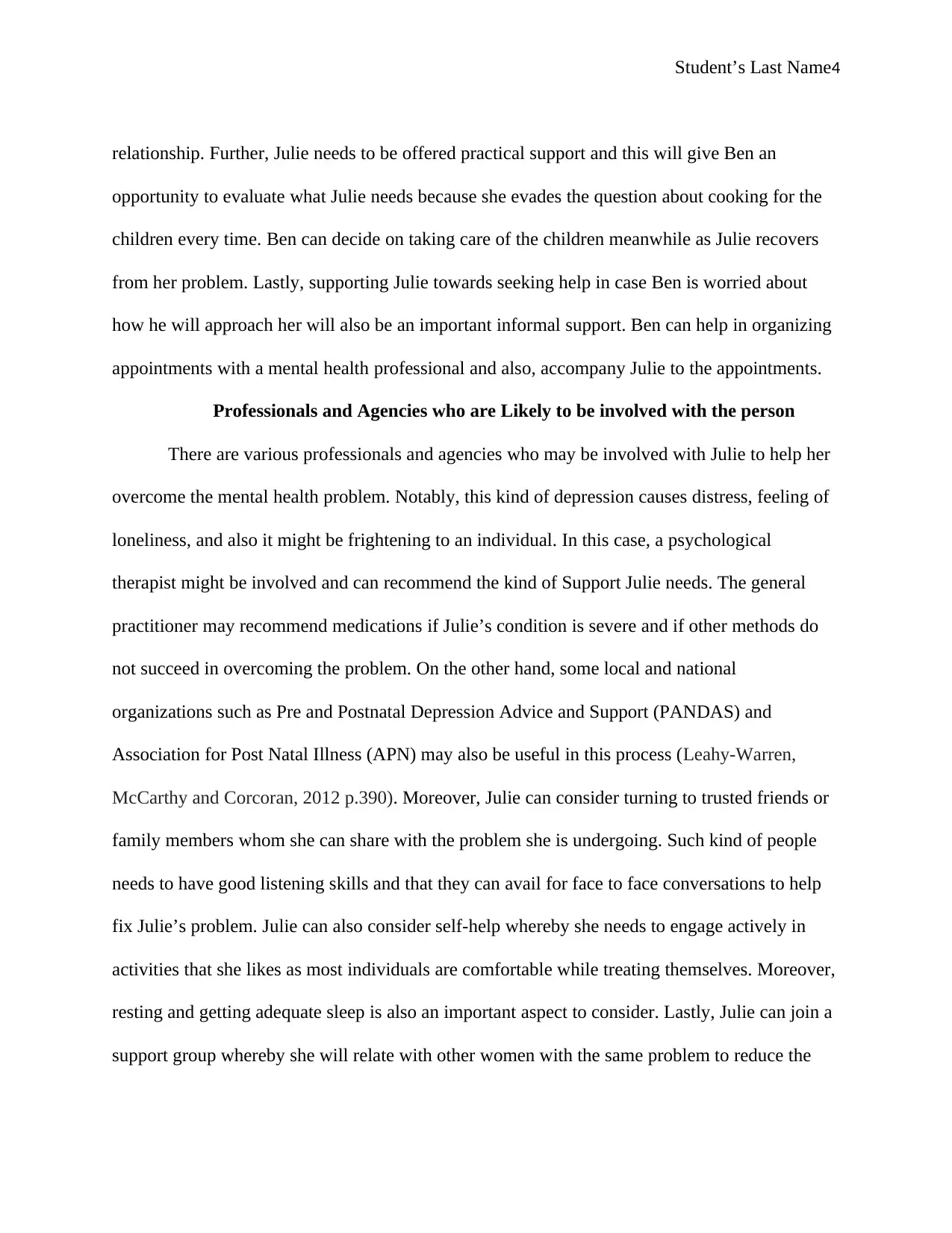
Student’s Last Name4
relationship. Further, Julie needs to be offered practical support and this will give Ben an
opportunity to evaluate what Julie needs because she evades the question about cooking for the
children every time. Ben can decide on taking care of the children meanwhile as Julie recovers
from her problem. Lastly, supporting Julie towards seeking help in case Ben is worried about
how he will approach her will also be an important informal support. Ben can help in organizing
appointments with a mental health professional and also, accompany Julie to the appointments.
Professionals and Agencies who are Likely to be involved with the person
There are various professionals and agencies who may be involved with Julie to help her
overcome the mental health problem. Notably, this kind of depression causes distress, feeling of
loneliness, and also it might be frightening to an individual. In this case, a psychological
therapist might be involved and can recommend the kind of Support Julie needs. The general
practitioner may recommend medications if Julie’s condition is severe and if other methods do
not succeed in overcoming the problem. On the other hand, some local and national
organizations such as Pre and Postnatal Depression Advice and Support (PANDAS) and
Association for Post Natal Illness (APN) may also be useful in this process (Leahy‐Warren,
McCarthy and Corcoran, 2012 p.390). Moreover, Julie can consider turning to trusted friends or
family members whom she can share with the problem she is undergoing. Such kind of people
needs to have good listening skills and that they can avail for face to face conversations to help
fix Julie’s problem. Julie can also consider self-help whereby she needs to engage actively in
activities that she likes as most individuals are comfortable while treating themselves. Moreover,
resting and getting adequate sleep is also an important aspect to consider. Lastly, Julie can join a
support group whereby she will relate with other women with the same problem to reduce the
relationship. Further, Julie needs to be offered practical support and this will give Ben an
opportunity to evaluate what Julie needs because she evades the question about cooking for the
children every time. Ben can decide on taking care of the children meanwhile as Julie recovers
from her problem. Lastly, supporting Julie towards seeking help in case Ben is worried about
how he will approach her will also be an important informal support. Ben can help in organizing
appointments with a mental health professional and also, accompany Julie to the appointments.
Professionals and Agencies who are Likely to be involved with the person
There are various professionals and agencies who may be involved with Julie to help her
overcome the mental health problem. Notably, this kind of depression causes distress, feeling of
loneliness, and also it might be frightening to an individual. In this case, a psychological
therapist might be involved and can recommend the kind of Support Julie needs. The general
practitioner may recommend medications if Julie’s condition is severe and if other methods do
not succeed in overcoming the problem. On the other hand, some local and national
organizations such as Pre and Postnatal Depression Advice and Support (PANDAS) and
Association for Post Natal Illness (APN) may also be useful in this process (Leahy‐Warren,
McCarthy and Corcoran, 2012 p.390). Moreover, Julie can consider turning to trusted friends or
family members whom she can share with the problem she is undergoing. Such kind of people
needs to have good listening skills and that they can avail for face to face conversations to help
fix Julie’s problem. Julie can also consider self-help whereby she needs to engage actively in
activities that she likes as most individuals are comfortable while treating themselves. Moreover,
resting and getting adequate sleep is also an important aspect to consider. Lastly, Julie can join a
support group whereby she will relate with other women with the same problem to reduce the
Paraphrase This Document
Need a fresh take? Get an instant paraphrase of this document with our AI Paraphraser
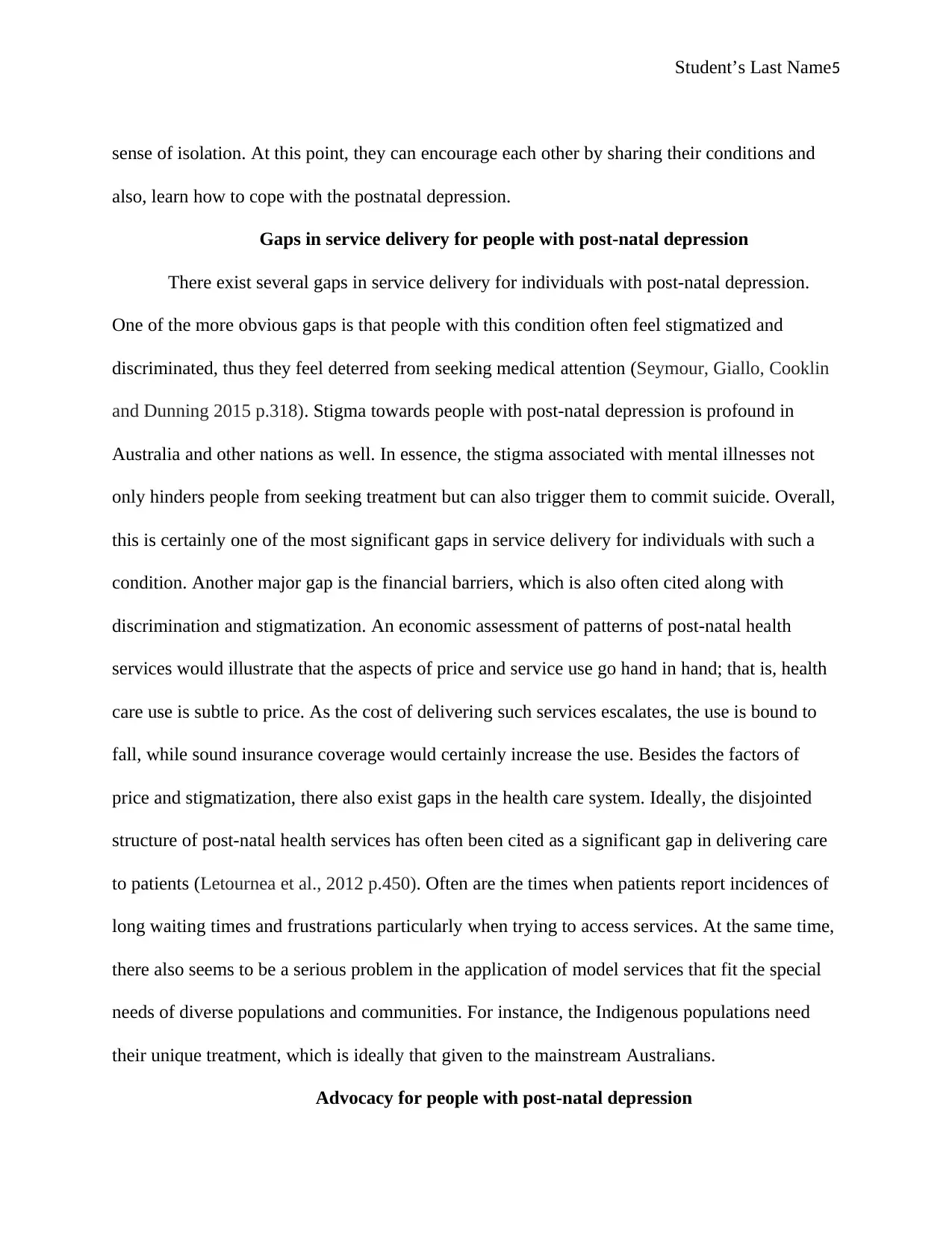
Student’s Last Name5
sense of isolation. At this point, they can encourage each other by sharing their conditions and
also, learn how to cope with the postnatal depression.
Gaps in service delivery for people with post-natal depression
There exist several gaps in service delivery for individuals with post-natal depression.
One of the more obvious gaps is that people with this condition often feel stigmatized and
discriminated, thus they feel deterred from seeking medical attention (Seymour, Giallo, Cooklin
and Dunning 2015 p.318). Stigma towards people with post-natal depression is profound in
Australia and other nations as well. In essence, the stigma associated with mental illnesses not
only hinders people from seeking treatment but can also trigger them to commit suicide. Overall,
this is certainly one of the most significant gaps in service delivery for individuals with such a
condition. Another major gap is the financial barriers, which is also often cited along with
discrimination and stigmatization. An economic assessment of patterns of post-natal health
services would illustrate that the aspects of price and service use go hand in hand; that is, health
care use is subtle to price. As the cost of delivering such services escalates, the use is bound to
fall, while sound insurance coverage would certainly increase the use. Besides the factors of
price and stigmatization, there also exist gaps in the health care system. Ideally, the disjointed
structure of post-natal health services has often been cited as a significant gap in delivering care
to patients (Letournea et al., 2012 p.450). Often are the times when patients report incidences of
long waiting times and frustrations particularly when trying to access services. At the same time,
there also seems to be a serious problem in the application of model services that fit the special
needs of diverse populations and communities. For instance, the Indigenous populations need
their unique treatment, which is ideally that given to the mainstream Australians.
Advocacy for people with post-natal depression
sense of isolation. At this point, they can encourage each other by sharing their conditions and
also, learn how to cope with the postnatal depression.
Gaps in service delivery for people with post-natal depression
There exist several gaps in service delivery for individuals with post-natal depression.
One of the more obvious gaps is that people with this condition often feel stigmatized and
discriminated, thus they feel deterred from seeking medical attention (Seymour, Giallo, Cooklin
and Dunning 2015 p.318). Stigma towards people with post-natal depression is profound in
Australia and other nations as well. In essence, the stigma associated with mental illnesses not
only hinders people from seeking treatment but can also trigger them to commit suicide. Overall,
this is certainly one of the most significant gaps in service delivery for individuals with such a
condition. Another major gap is the financial barriers, which is also often cited along with
discrimination and stigmatization. An economic assessment of patterns of post-natal health
services would illustrate that the aspects of price and service use go hand in hand; that is, health
care use is subtle to price. As the cost of delivering such services escalates, the use is bound to
fall, while sound insurance coverage would certainly increase the use. Besides the factors of
price and stigmatization, there also exist gaps in the health care system. Ideally, the disjointed
structure of post-natal health services has often been cited as a significant gap in delivering care
to patients (Letournea et al., 2012 p.450). Often are the times when patients report incidences of
long waiting times and frustrations particularly when trying to access services. At the same time,
there also seems to be a serious problem in the application of model services that fit the special
needs of diverse populations and communities. For instance, the Indigenous populations need
their unique treatment, which is ideally that given to the mainstream Australians.
Advocacy for people with post-natal depression
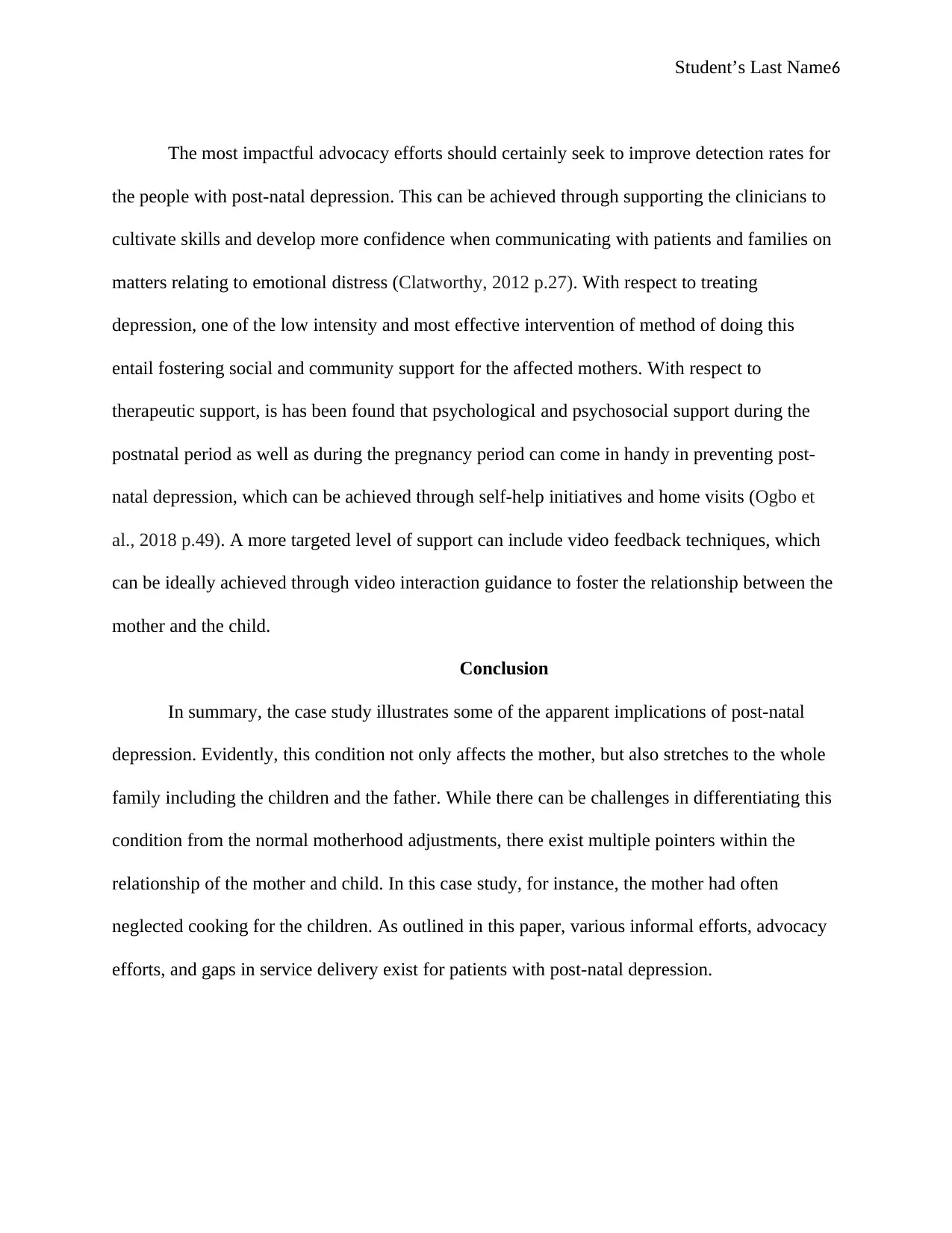
Student’s Last Name6
The most impactful advocacy efforts should certainly seek to improve detection rates for
the people with post-natal depression. This can be achieved through supporting the clinicians to
cultivate skills and develop more confidence when communicating with patients and families on
matters relating to emotional distress (Clatworthy, 2012 p.27). With respect to treating
depression, one of the low intensity and most effective intervention of method of doing this
entail fostering social and community support for the affected mothers. With respect to
therapeutic support, is has been found that psychological and psychosocial support during the
postnatal period as well as during the pregnancy period can come in handy in preventing post-
natal depression, which can be achieved through self-help initiatives and home visits (Ogbo et
al., 2018 p.49). A more targeted level of support can include video feedback techniques, which
can be ideally achieved through video interaction guidance to foster the relationship between the
mother and the child.
Conclusion
In summary, the case study illustrates some of the apparent implications of post-natal
depression. Evidently, this condition not only affects the mother, but also stretches to the whole
family including the children and the father. While there can be challenges in differentiating this
condition from the normal motherhood adjustments, there exist multiple pointers within the
relationship of the mother and child. In this case study, for instance, the mother had often
neglected cooking for the children. As outlined in this paper, various informal efforts, advocacy
efforts, and gaps in service delivery exist for patients with post-natal depression.
The most impactful advocacy efforts should certainly seek to improve detection rates for
the people with post-natal depression. This can be achieved through supporting the clinicians to
cultivate skills and develop more confidence when communicating with patients and families on
matters relating to emotional distress (Clatworthy, 2012 p.27). With respect to treating
depression, one of the low intensity and most effective intervention of method of doing this
entail fostering social and community support for the affected mothers. With respect to
therapeutic support, is has been found that psychological and psychosocial support during the
postnatal period as well as during the pregnancy period can come in handy in preventing post-
natal depression, which can be achieved through self-help initiatives and home visits (Ogbo et
al., 2018 p.49). A more targeted level of support can include video feedback techniques, which
can be ideally achieved through video interaction guidance to foster the relationship between the
mother and the child.
Conclusion
In summary, the case study illustrates some of the apparent implications of post-natal
depression. Evidently, this condition not only affects the mother, but also stretches to the whole
family including the children and the father. While there can be challenges in differentiating this
condition from the normal motherhood adjustments, there exist multiple pointers within the
relationship of the mother and child. In this case study, for instance, the mother had often
neglected cooking for the children. As outlined in this paper, various informal efforts, advocacy
efforts, and gaps in service delivery exist for patients with post-natal depression.
⊘ This is a preview!⊘
Do you want full access?
Subscribe today to unlock all pages.

Trusted by 1+ million students worldwide
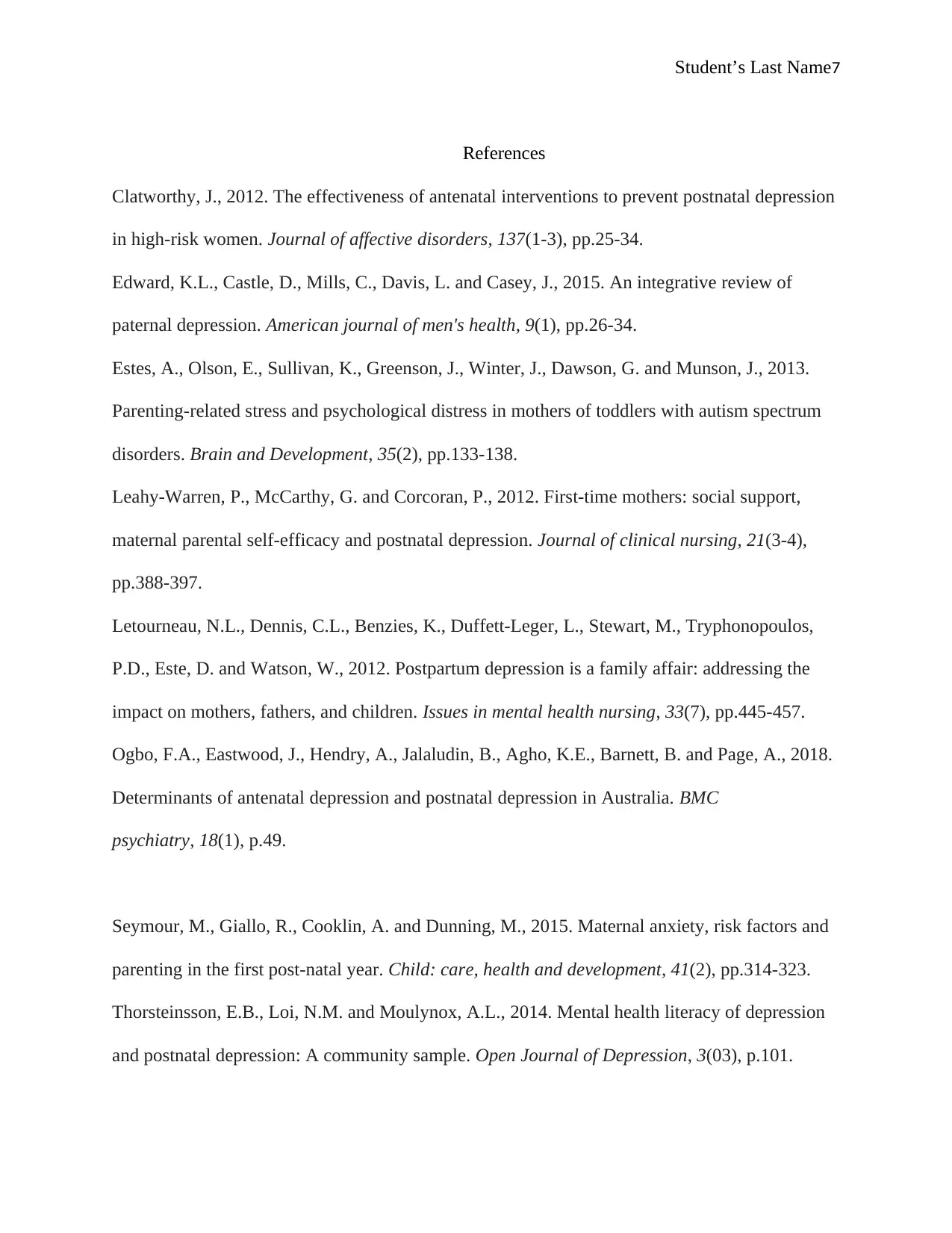
Student’s Last Name7
References
Clatworthy, J., 2012. The effectiveness of antenatal interventions to prevent postnatal depression
in high-risk women. Journal of affective disorders, 137(1-3), pp.25-34.
Edward, K.L., Castle, D., Mills, C., Davis, L. and Casey, J., 2015. An integrative review of
paternal depression. American journal of men's health, 9(1), pp.26-34.
Estes, A., Olson, E., Sullivan, K., Greenson, J., Winter, J., Dawson, G. and Munson, J., 2013.
Parenting-related stress and psychological distress in mothers of toddlers with autism spectrum
disorders. Brain and Development, 35(2), pp.133-138.
Leahy‐Warren, P., McCarthy, G. and Corcoran, P., 2012. First‐time mothers: social support,
maternal parental self‐efficacy and postnatal depression. Journal of clinical nursing, 21(3‐4),
pp.388-397.
Letourneau, N.L., Dennis, C.L., Benzies, K., Duffett-Leger, L., Stewart, M., Tryphonopoulos,
P.D., Este, D. and Watson, W., 2012. Postpartum depression is a family affair: addressing the
impact on mothers, fathers, and children. Issues in mental health nursing, 33(7), pp.445-457.
Ogbo, F.A., Eastwood, J., Hendry, A., Jalaludin, B., Agho, K.E., Barnett, B. and Page, A., 2018.
Determinants of antenatal depression and postnatal depression in Australia. BMC
psychiatry, 18(1), p.49.
Seymour, M., Giallo, R., Cooklin, A. and Dunning, M., 2015. Maternal anxiety, risk factors and
parenting in the first post‐natal year. Child: care, health and development, 41(2), pp.314-323.
Thorsteinsson, E.B., Loi, N.M. and Moulynox, A.L., 2014. Mental health literacy of depression
and postnatal depression: A community sample. Open Journal of Depression, 3(03), p.101.
References
Clatworthy, J., 2012. The effectiveness of antenatal interventions to prevent postnatal depression
in high-risk women. Journal of affective disorders, 137(1-3), pp.25-34.
Edward, K.L., Castle, D., Mills, C., Davis, L. and Casey, J., 2015. An integrative review of
paternal depression. American journal of men's health, 9(1), pp.26-34.
Estes, A., Olson, E., Sullivan, K., Greenson, J., Winter, J., Dawson, G. and Munson, J., 2013.
Parenting-related stress and psychological distress in mothers of toddlers with autism spectrum
disorders. Brain and Development, 35(2), pp.133-138.
Leahy‐Warren, P., McCarthy, G. and Corcoran, P., 2012. First‐time mothers: social support,
maternal parental self‐efficacy and postnatal depression. Journal of clinical nursing, 21(3‐4),
pp.388-397.
Letourneau, N.L., Dennis, C.L., Benzies, K., Duffett-Leger, L., Stewart, M., Tryphonopoulos,
P.D., Este, D. and Watson, W., 2012. Postpartum depression is a family affair: addressing the
impact on mothers, fathers, and children. Issues in mental health nursing, 33(7), pp.445-457.
Ogbo, F.A., Eastwood, J., Hendry, A., Jalaludin, B., Agho, K.E., Barnett, B. and Page, A., 2018.
Determinants of antenatal depression and postnatal depression in Australia. BMC
psychiatry, 18(1), p.49.
Seymour, M., Giallo, R., Cooklin, A. and Dunning, M., 2015. Maternal anxiety, risk factors and
parenting in the first post‐natal year. Child: care, health and development, 41(2), pp.314-323.
Thorsteinsson, E.B., Loi, N.M. and Moulynox, A.L., 2014. Mental health literacy of depression
and postnatal depression: A community sample. Open Journal of Depression, 3(03), p.101.
Paraphrase This Document
Need a fresh take? Get an instant paraphrase of this document with our AI Paraphraser

Student’s Last Name8
Wilson, S., McKenzie, K., Quayle, E. and Murray, G.C., 2013. The postnatal support needs of
mothers with an intellectual disability. Midwifery, 29(6), pp.592-598.
Wilson, S., McKenzie, K., Quayle, E. and Murray, G.C., 2013. The postnatal support needs of
mothers with an intellectual disability. Midwifery, 29(6), pp.592-598.
1 out of 8
Related Documents
Your All-in-One AI-Powered Toolkit for Academic Success.
+13062052269
info@desklib.com
Available 24*7 on WhatsApp / Email
![[object Object]](/_next/static/media/star-bottom.7253800d.svg)
Unlock your academic potential
Copyright © 2020–2025 A2Z Services. All Rights Reserved. Developed and managed by ZUCOL.





